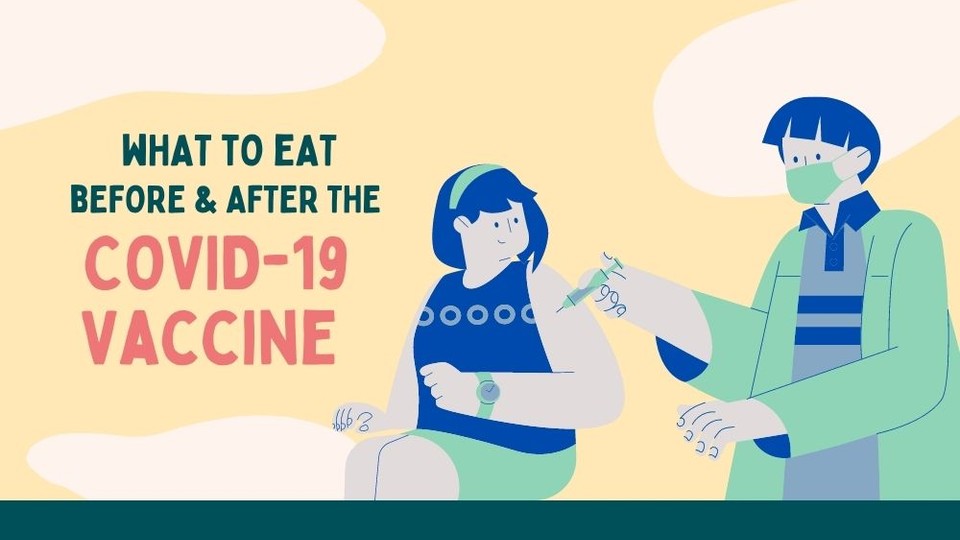
As of mid-August 2021, more than 15 million COVID-19 vaccine doses have been administered nationwide in Australia. [1] These vaccines can effectively protect you from catching or spreading the virus.
You might be gearing up for your first or second COVID-19 vaccine dose, and you may have heard a family member, friend, co-worker, or the news mention the post-vaccination side effects. While these are typically mild and fall outside the life-threatening category, many people experience discomfort and unpleasant side effects after getting their shot.
Unfortunately, there is no foolproof or surefire way to keep those vaccine side effects at bay. And similarly, no miracle supplement or diet hack can provide you complete immunity from the COVID-19 virus. But what you choose to consume and avoid pre and post-vaccination may help you feel slightly better throughout the entire process and boost your immune system’s function.
How Is Nutrition Linked To COVID-19?
Numerous studies have investigated the link between COVID-19 susceptibility and poor nutrition. Based on their findings, researchers suggest that unhealthy eating routines are somewhat linked to your immune system function, and thus, how susceptible you are to a viral or bacterial infection. [2]
Nevertheless, it is crucial to note that practising a healthy and wholesome diet is not enough to fully protect you from the coronavirus, which is where other preventative measures and vaccinations come into play. [3]
You might have heard of the term anti-inflammatory foods. But to grasp how anti-inflammatory foods can support your overall health, we would need some understanding of what inflammation is and how it affects your overall physical wellbeing.
And this brings us to our next point.
Are Anti-inflammatory Foods Helpful?
While no research has concretely proven that what you eat can affect the efficacy of the COVID-19 vaccine, there have been conclusive findings associating your eating habits with your overall physical health and immune system function. [2]
Since chronic and abnormal inflammatory processes can impair your immune system, it’s crucial to practise sustainable healthy eating habits pre-vaccination, post-vaccination, and beyond that. And one way you can do this is by incorporating larger quantities of anti-inflammatory foods into your daily diet. These foods help minimise the level of inflammation in your body, therefore, optimising your immune system’s functioning. [2]
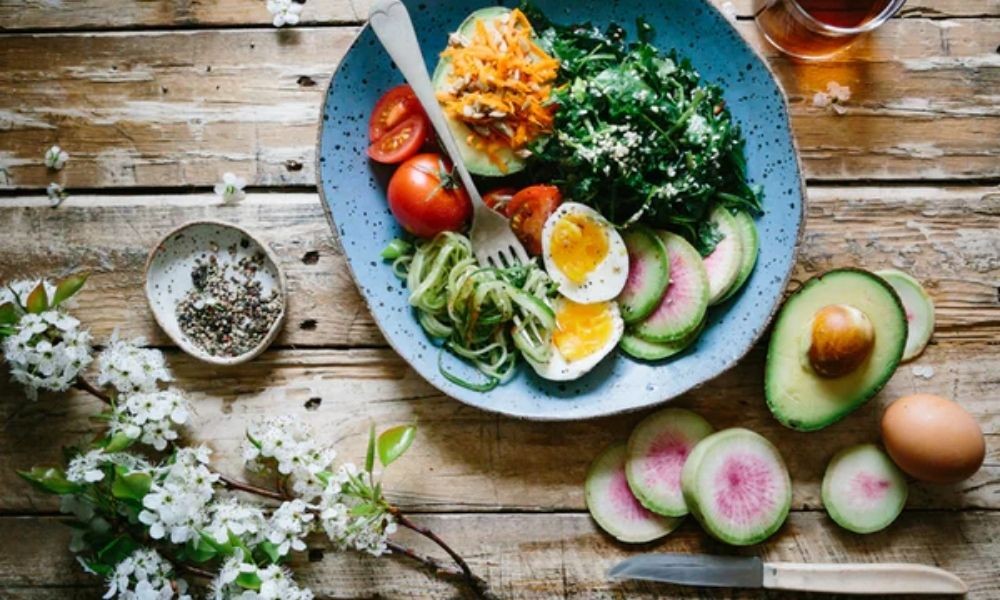
Some anti-inflammatory foods include:
- Nuts
- Fatty fishes
- Olive oil
- Tomatoes
- Avocados
- Chia seeds and flax seeds
- Fresh fruits, such as cherries, oranges, and berries
- Leafy green vegetables, such as kale and spinach [5]
A popular spice, turmeric, is an earthy yellow-coloured popular ingredient with potent antioxidant and anti-inflammatory properties. However, due to the low bioavailability of turmeric in our body, this spice is often combined with black pepper in recipes and supplements to boost efficacy and absorption. [6]
Unfortunately, there’s no concrete evidence that anti-inflammatory foods will help mitigate or reduce the risk of side effects after you get vaccinated. But practising a balanced diet is crucial in safeguarding your health and ensuring your immune system is not compromised or overburdened while you’re building immunity post-vaccine.
As a bonus, anti-inflammatory foods also bring about a plethora of other possible health benefits. These foods may help combat chronic inflammatory diseases such as arthritis, decrease the risk of heart diseases, improve blood sugar management, lower cholesterol and blood fats levels, and enhance mood and energy. [7]
Of course, Rome wasn’t built in a day. Likewise, you are unlikely to reap all the vast benefits of healthy eating overnight. And let’s be honest, it is no easy feat to bid farewell to tempting snacks and delicacies! But in the long run, your body will thank you for choosing healthier eating habits over detrimental ones.
Do Any Other Foods Help?
According to the Centers for Disease Control and Prevention (CDC), some common side effects from the COVID-19 vaccination include fatigue, body aches, headaches, chills, fever, and nausea. [8] While these aren’t life-threatening, they can be unpleasant and uncomfortable.
There are no foods that can effectively prevent these vaccine side effects. However, you may prefer foods that are comforting, warm, and easier to swallow, especially if you experience side effects such as nausea and fatigue.
There are some foods you can keep at hand, such as ginger tea, herbal teas, chicken broth and soups, crackers, and bananas. [9] Ginger tea, herbal teas, bananas, and crackers may help tackle feelings of nausea, while hot broths and soups are comforting, easy to down, and help keep you hydrated.
What Foods Should I Avoid?
According to research, adopting unhealthy dietary habits is linked to chronic low-grade inflammation, which increases oxidative stress. This ultimately affects the proper functioning of your immune system and renders you more susceptible to infections.
While exercise and getting a good night’s sleep are fundamental to your overall wellbeing, your diet is another crucial pillar that plays a non-negotiably critical role in preserving your health.
Hence, it’s best to limit your consumption of pro-inflammatory foods, processed foods, or foods high in sugar, such as chocolate, soft drinks, cakes, and doughnuts. [10]
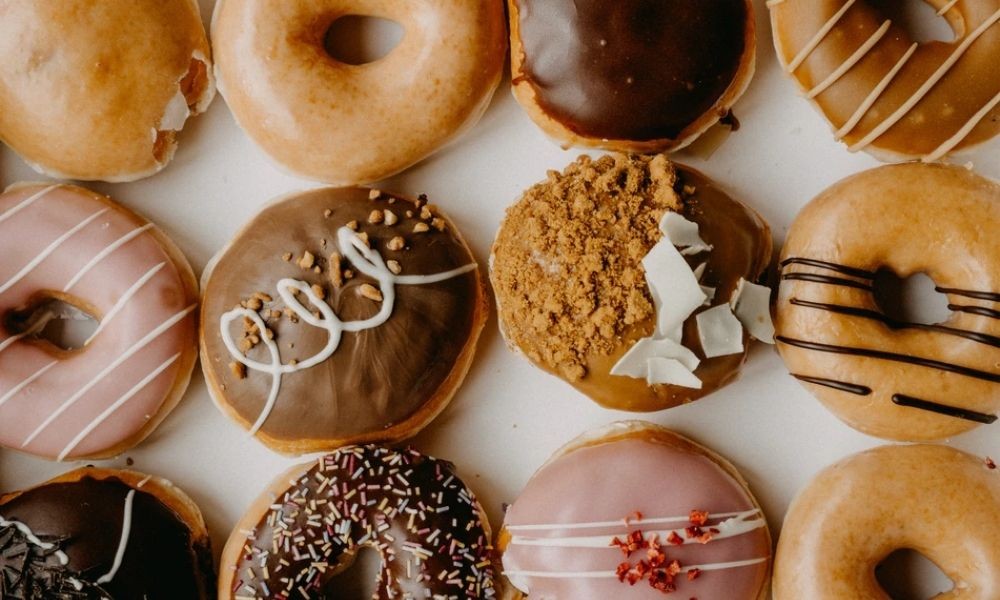
Additionally, foods packed with unhealthy fats such as deep-fried foods can raise the level of inflammation in your body. And in the long run, eating excessive amounts of foods packed with these unhealthy fats may hamper the proper functioning of your immune system. [10]
Other than that, refined carbohydrates found in some candies, bread, cereal, pasta, and pastries can raise your blood sugar levels and contribute to pro-inflammatory effects. [10]
It may be a close-to-impossible task to eliminate all these foods from your diet completely. So, practise moderation instead!
Shift your focus towards green vegetables, fresh fruits, whole grains, and anti-inflammatory foods while gradually reducing your intake of processed and pro-inflammatory foods in your daily meals. A small change day by day will go a long way!
How About Coffee Or Alcohol?
Hydration is vital before and after getting your shot, but what liquids you chug down may make a difference.
In both the Australian Government Department of Health and the CDC’s COVID-19 vaccine guidelines, there’s no mention of the effects of alcohol consumption before or after your jab. However, participants were not instructed to abstain from alcohol during the clinical trials. Thus far, no negative reports have surfaced revealing adverse effects from drinking alcohol pre or post-vaccination. [11]
In short, there’s no evidence that alcohol consumption can hamper the efficacy of the COVID-19 vaccine. However, don’t celebrate your jab by swigging a bottle of fine wine just yet.
The common side effects of the vaccine include headaches, fatigue, body aches, nausea, and chills. And you might have guessed that these side effects overlap with the symptoms of the infamously dreaded hangover. [12]
So, unfortunately, consuming alcohol soon after your jab may predispose you to a nastier post-vaccine experience. Too much alcohol may aggravate any vaccine side effects and leave your body in shambles while it simultaneously struggles to handle both side effects from the vaccine and excessive alcohol intake.
In addition to that, there are no explicit black-and-white instructions to avoid coffee pre and post-jab from any governmental agencies or organisations. However, similarly to alcohol, some people will experience side effects from drinking coffee.
Hence, whether or not you should abstain from coffee right after your shot depends on your body’s response to it!

Suppose you tend to experience nausea after relishing in a fragrant cup of coffee. In that case, you may prefer staying off it right after your shot to avoid aggravating or exacerbating possible vaccine side effects. Coffee may also cause nervousness, insomnia, and restlessness, thus, affecting how well you can rest and recover after your COVID-19 vaccine. [13] So if coffee gets your heart racing and hurls your body into overdrive, it’s best to lay it off for a bit while you rest!
A final thing to note is that most authorities have requested public support in reporting side effects from the vaccine. Therefore, having coffee or alcohol too early on after your shot may muddle the situation, causing you to mistakenly report side effects from their consumption as side effects from the vaccine. So it’s best to cross off that grey area instead!
In short, it’s crucial to stay well-hydrated. And while plain water may not be the most thrilling drink to chug down, it comes with a plethora of health benefits and is the safest bet right after your shot.
What Supplements Should I Take?
Certain nutrients play a role in supporting your immune system’s ability to ward off diseases and infections. These nutrients include vitamin C, vitamin D, vitamin A, and B vitamins and minerals such as zinc and iron, which can all be sourced from foods or supplements. [14]
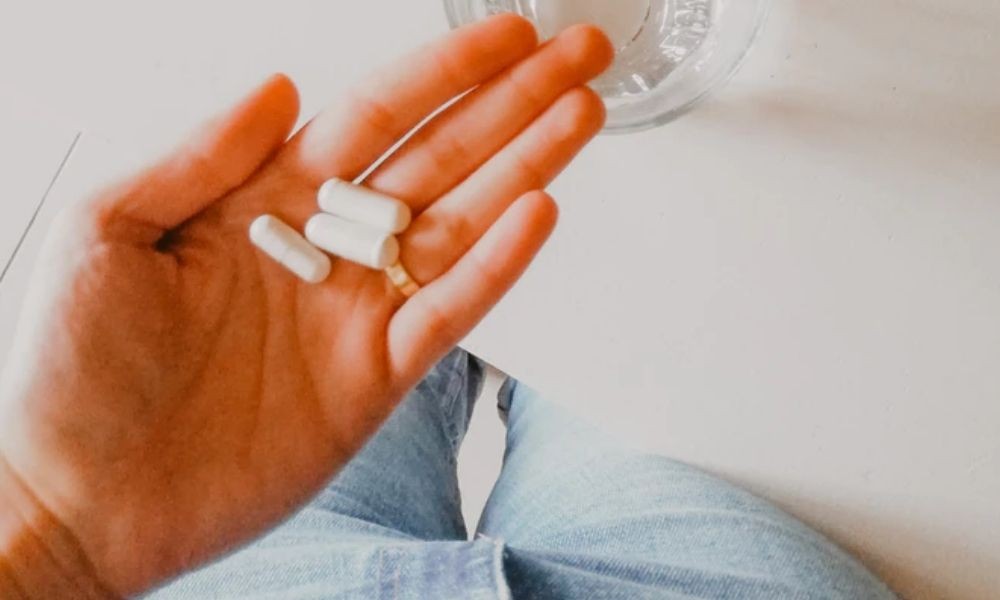
You might be considering adding these supplements into your arsenal of anti-coronavirus measures, but in some instances, these supplements may just be draining your bank account. In fact, the NHS notes that most people with no medical conditions who take a healthy and balanced diet do not require additional vitamins or supplements. [15]
If you have a vitamin or mineral deficiency, it’s best to consult your healthcare provider and heed their advice regarding the dose and type of supplement you should take to fortify your health. Other than that, research suggests that no supplement can 100% prevent you from catching COVID-19 or effectively cure you of this infection, despite numerous convincing news stories and claims. [14]
Hence, take these wildly circulated news and messages declaring these benefits with a grain of salt. When in doubt, seek the advice of someone qualified, such as your doctor, nutritionist, dietitian, or pharmacist.
While paracetamol isn’t a supplement, the CDC notes that you can discuss with your doctor about consuming this medication to alleviate side effects post-vaccination. Generally, it is safe to take if you do not have any other medical conditions. [16] As of now, the CDC has not advocated using any supplements to prevent or alleviate vaccine side effects.
Food Safety + Diet Tips During the COVID-19 Pandemic
COVID-19 is not a foodborne disease, meaning that it’s unlikely to spread from one person to another via foods and drinks or through swallowing the virus. Nevertheless, it’s a good idea to practise safety measures when grocery shopping and handling or preparing food, even after you’ve been fully vaccinated.
Getting your groceries
To safeguard your health and that of other shoppers and grocery store workers, here are some safety measures you can carry out during your supermarket trips!
- Do not go out if you have a fever or any other symptoms suggestive of COVID-19.
- Follow the guidelines and regulations provided by the supermarket and governmental agencies while you’re out.
- Social distancing is crucial, and you may wish to confine your grocery shopping trips to non-peak hours.
- Have your shopping list prepped in advance, so you don’t have to make multiple trips to stores or spend too long pondering about what you need to buy.
- Use cards or e-payment apps to minimise physical contact or contact with cash.
- There is no concrete evidence proving that food packaging is linked to the transmission of COVID-19. However, as a precautionary step, you may wish to wipe down your groceries once you’re home. [18]
Food safety
When preparing or cooking meals at home, these are some preventive food safety measures you can put into practice to safeguard your family’s health.
- Rinse all your fresh fruits and vegetables under clean water, even if you do not consume the skin or coating.
- Refrigerate all perishable food items within 2 hours of purchase.
- Remember to practice good hand hygiene and avoid preparing meals if you display respiratory infection symptoms.
- Clean your kitchen tops and counters regularly with a safe disinfectant product. [18]
Meal prepping
If you wish to avoid dining out, meal prepping at home is a fantastic way to keep your stomach full and your wallet happy! Of course, it’s crucial to prepare nutritious, wholesome, and nourishing meals to ensure you and your family stay in the pink of health.
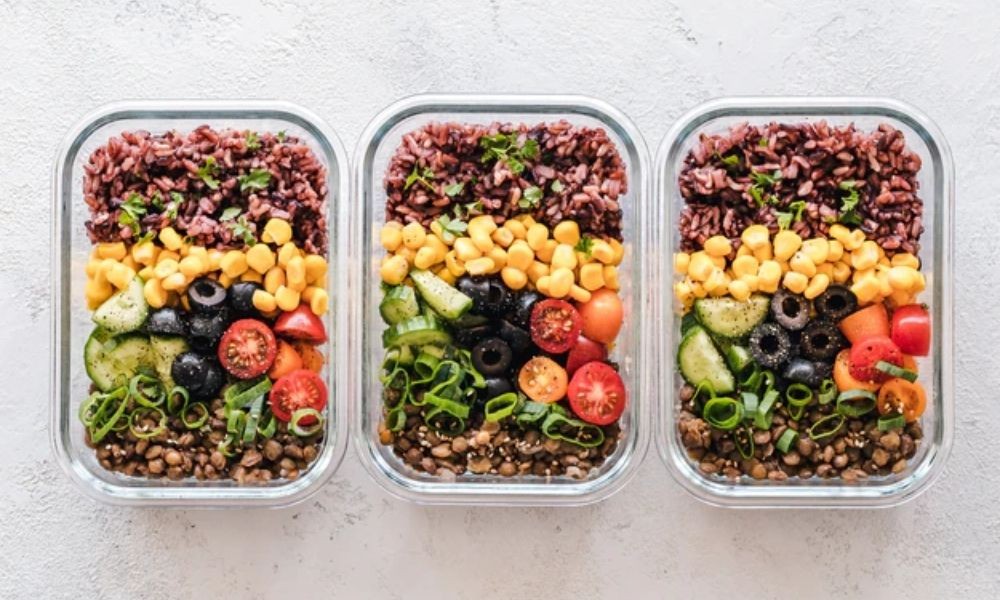
Other than incorporating anti-inflammatory foods into your meals, here are some other diet tips based on recommendations from the Australian Government’s Department of Health. You may wish to keep this in mind while you’re meal prepping!
1) A nutritious meal contains more than one food group. To elevate the variety, flavour, and nutrient profile of your meals, incorporate all the following food groups in your daily meals:
- Grain foods (higher percentage of whole grains) including bread, quinoa, oats, and barley
- Fresh fruits
- Vegetables, legumes, and beans consisting of different types and colours
- Lean meat, eggs, fish, nuts, seeds, and tofu
- Milk, yoghurt, and cheese, or their alternatives [18]
2) Of course, the specific amount of each food group to include in meals varies from person to person. If you have any medical conditions or allergies, then consulting a dietitian is a fantastic way to discover how you can craft well-balanced, nutritious, and delicious meals while prioritising your health! [18]
3) You may wish to prep your meals a few days or even a week in advance. Soups, stews, and curries store decently well in the freezer. [18] Preparing meals in advance may also come in handy if you happen to feel under the weather after getting your jab. Understandably, due to side effects, you may not be keen on labouring in the kitchen and whipping up full-course meals too soon after your shot.
4) Staying well-hydrated is crucial to keep your body in tip-top condition. [18] If meal prepping healthy juices or smoothies in advance helps you stay better hydrated, that’s something you may wish to incorporate into your weekly meal preps! Nevertheless, drinking a sufficient amount of water daily is key to good health! Due to certain medical conditions, you may have liquid restrictions, so clarify any possible doubts with your healthcare provider.
Hopefully, these tips may guide you in building, planning, and assembling nutritious meals so that you can attain wealth in health, even amidst the COVID-19 pandemic.
Not keen on rustling up your own meals?
We’ve got you covered with some nutritious meals from several top meal service providers, which you can order in advance.
While these meals are generally healthy and nourishing, look through the ingredients list before ordering, especially if you have any dietary restrictions, specific requirements, or intolerances and allergies.
To assemble this list, we’ve considered a few aspects; We’ve selected meals that are comforting and easy to down in case you feel a little nauseous after your jab. Additionally, these dishes carry a decent macronutrient profile and a reasonable price tag!
Here’s a table of nutritious meals we’ve handpicked from several Australian meal service providers!
Name
Meal Service Provider Price (AUD) Serving Size (g) Calories Per Serve
Slow-Cooked BBQ Beef & Mash
Youfoodz 9.95 326 336
Beef Lasagne
Youfoodz 9.95 300 468
Loaded Lentil Lasagne (Vegan)
Youfoodz 9.95 300 396
Slow-Cooked Lamb With Loaded Mash
Youfoodz 9.95 350 446
Chicken Stroganoff, Mixed Potato Mash
Chefgood 10.80-11.90 350 476
Vegan Mac & Cheese
Chefgood 10.80-11.90 325 437
Vegan Cottage Pie with Sweet Potato Mash & Green Vegetables
My Muscle Chef 9.55 380 389
Vegan Chicken Satay with Cauliflower & Quinoa Rice
My Muscle Chef 9.55 320 453
Coconut Turmeric Chicken with Pumpkin Mash
My Muscle Chef 9.55 350 422
Clean Cottage Pie
CORE Powerfoods 9.00 350 418
Beef Taco Bowl
CORE Powerfoods 9.00 350 444
Mum's Chicken Minestrone Soup
MACROS 8.95-10.95 350 305
Japanese Miso Salmon
MACROS 8.95-10.95 350 502
Tantalising Tofu Miso Soup (Plant-based)
Soulara 8.50-11.50 400 326
Warming Mushroom Earth Bowl (Plant-based)
Soulara 8.50-11.50 400 341


